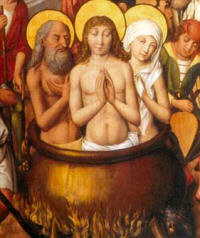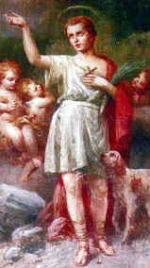
CHAPTER X. How the Night-Office is to Be Said in Summer Time
12 Feb. 13 June. 13 Oct.
From Easter to the first of November let the same number of Psalms be recited as prescribed above; only that no lessons are to be read from the book, on account of the shortness of the night: but instead of those three lessons let one from the Old Testament be said by heart, followed by a short responsory, and the rest as before laid down; so that never less than twelve Psalms, not counting the third and ninety-fourth, be said at the Night-Office.
The Psalmody of Matins
Taking into account the shortness of summer nights, Saint Benedict reduces the Night Office (Matins or Vigils) to its essential component: the psalmody, ordering that "never less than twelve Psalms, not counting the third and ninety-fourth, be said at the Night-Office." It is clear that, for Saint Benedict, what matters, above all the rest, is faithfulness to the established rule of psalmody.
Every monk (and Oblate) will, consequently, cultivate a profound attachment to the daily offering of psalms that structures the very rhythm of Benedictine life. While monasteries are bound daily, by the Holy Rule, to the fourteen psalms of the Night Office, Oblates living in the world with family obligations, will not be able to take on quite as much. There will be Oblates, for example, who will say no more than Psalm 3 and Psalm 94 for their Matins, or even Psalm 94 only. They will do this in great peace of conscience, drawing comfort from the fact that in the monastery of their Oblation the full offering of psalmody is rising to God faithfully on their behalf, by day and by night.
The Index of a Peaceful and Well-Ordered Heart
Saint Athanasius writes in his Letter on the Psalms to Marcellinus:
When . . . the Psalms are chanted, it is not from any mere desire for sweet music but as the outward expression of the inward harmony obtaining in the soul, because such harmonious recitation is in itself the index of a peaceful and well-ordered heart. To praise God tunefully upon an instrument, such as well-tuned cymbals, cithara, or ten-stringed psaltery, is, as we know, an outward token that the members of the body and the thoughts of the heart are, like the instruments themselves, in proper order and control, all of them together living and moving by the Spirit's cry and breath. And similarly, as it is written that By the Spirit a man lives and mortifies his bodily actions, [Rom 8:13] so he who sings well puts his soul in tune, correcting by degrees its faulty rhythm so that at last, being truly natural and integrated, it has fear of nothing, but in peaceful freedom from all vain imaginings may apply itself with greater longing to the good things to come. For a soul rightly ordered by chanting the sacred words forgets its own afflictions and contemplates with joy the things of Christ alone.
So then, my son, let whoever reads this Book of Psalms take the things in it quite simply as God-inspired; and let each select from it, as from the fruits of a garden, those things of which he sees himself in need. For I think that in the words of this book all human life is covered, with all its states and thoughts, and that nothing further can be found in man. For no matter what you seek, whether it be repentance and confession, or help in trouble and temptation or under persecution, whether you have been set free from plots and snares or, on the contrary, are sad for any reason, or whether, seeing yourself progressing and your enemy cast down, you want to praise and thank and bless the Lord, each of these things the Divine Psalms show you how to do, and in every case the words you want are written down for you, and you can say them as your own.

CHAPTER XI. How the Night-Office is to Be Said on Sundays
13 Feb. 14 June. 14 Oct.
On Sunday let the brethren rise earlier for the Night-Office, which is to be arranged as follows. When six Psalms and a versicle have been sung (as already prescribed), all being seated in order in their stalls, let four lessons with their responsories be read from the book, as before: and to the last responsory only let the reader add a Gloria, all reverently rising as soon as he begins it. After the lessons let six more Psalms follow in order, with their antiphons and versicle as before; and then let four more lessons, with their responsories, be read in the same way as the former. Next let three canticles from the Prophets be said, as the Abbot shall appoint, which canticles are to be sung with an Alleluia. After the versicle, and the blessing given by the Abbot, let four more lessons from the New Testament be read as before; and at the end of the fourth responsory, let the Abbot begin the hymn, Te Deum laudamus. After the hymn, let the Abbot read the lesson from the Gospel, while all stand in awe and reverence. The Gospel being ended, let all answer Amen. Then let the Abbot go on with the hymn, Te decet laus; and after the blessing hath been given,* let them begin Lauds. This order for the Night-Offices is always to be observed on Sunday, alike in summer and in winter, unless perchance (which God forbid) they rise too late, in which case the lessons or responsories must be somewhat shortened.* Let all care, however, be taken that this do not happen; but if it should, let him, through whose neglect it hath come to pass, make satisfaction for it in the oratory.
In Reverent Adoration of the Most Holy Trinity
Saint Benedict, being a practical man, advances the hour of the Night Office on Sunday by reason its length. The fundamental fourteen psalms are already in place. After the psalmody of the First Nocturn (or Watch) there are four lessons and responsories: an alternation of lectio and meditatio. Saint Benedict solemnizes the fourth responsory by concluding it with the Gloria Patri; during the chanting of the doxology the monks rise out of reverence for the Triune God and, according to the traditional practice, bow profoundly in adoration.
The Canticles and the Apostle
The Second Nocturn unfolds like the First, but it is followed by a Third Nocturn, composed of three Canticles from the Old Testament accompanied by an alleluiatic antiphon. Thus does Saint Benedict orchestrate a liturgical ascent to the proclamation of the Holy Gospel that is the culmination of the Night Office on Sunday. After the Canticles of the Third Nocturn, the Apostle Saint Paul appears as the herald of the grace of the risen Christ; there are four lessons drawn, as a rule, from his Epistles.
The Te Deum
After the fourth responsory, the Abbot intones the grand hymn of thanksgiving and praise, the Te Deum. The Te Deum serves as an immediate preparation for the right hearing of the Holy Gospel, just as the Alleluia does at Holy Mass. Praise precedes the proclamation of the Holy Gospel because praise dilates the heart with joy and elevates the mind to the beauty of God and to His perfections. Only a heart thus dilated can hear the Gospel rightly and fruitfully.
Thee God do we praise, * Thee Lord do we confess.
Thee, O Father Everlasting, * all the world doth hold in awe.
To Thee all the Angels, * Thee the Heavens and all the celestial Powers,
To Thee Cherubim and Seraphim, * proclaim with ceaseless voice:
Holy!
Holy!
Holy! * Lord God of Sabaoth!
Full the heavens and full the earth * of the Majesty of Thy glory.
Thine the praise * of the glorious choir of the Apostles,
Thine the praise * of the Prophets' worthy throng.
Thine the praise * of the Martys' shining army.
To Thee goeth up the praise of Holy Church * from every place in this round world:
To Thee, O Father * of immeasurable Majesty;
To Thine only Son, * adorable and true;
And to the Holy Ghost, * our Advocate and Comforter.
Thou, O Christ, * art the King of glory!
Thou, O Christ * art the Father's ageless Son.
Thou, to bear mankind upon thy shoulders, * the Virgin's womb didst not disdain.
Thou, death's bitter sting didst vanquish; * to believers heaven's kingdom opening wide.
Thou sittest now at God's right hand, * in the glory of the Father.
Thou shalt come to be our Judge; * this we do believe.
We bid Thee help Thou, then, Thine own * whom with Thy precious Blood Thou hast redeemed.
Number Thou them among Thy saints * in glory everlasting.
Salvation for Thy people, O Lord, * and blessings upon Thine inheritance!
Be Thou their King * and raise them up forever.
Day by day, * shall we bless Thee.
And praise Thy Name forever, * yea, even unto the ages of ages,
Deign Thou, this day, O Lord, * to keep us safe from sin.
Mercy upon us, O Lord, * mercy upon us.
Upon us be Thy mercy, O Lord, * for upon Thee have we fixed our hope.
In Thee, O Lord, I have hoped; * let me not be put to shame in the age to come.
With Awe and Reverence
Towards the end of the Te Deum, a server brings the stole in the liturgical colour of the day to the Abbot (or Prior). If the Book of the Gospels is not carried to the Abbot (or Prior) at his place in choir, he goes to the lectern in the middle of the choir to chant the appointed Gospel there while, as Saint Benedict says, "all stand in awe and reverence." The importance given here to awe and reverence is characteristically Benedictine; it is an expression of the virtue of religion.

Surely He Is Coming Soon
The liturgic Gospel at Matins is, according to the venerable Abbot Herwegen of Maria Laach, a kind of parousia, an epiphany of the risen Christ in the midst of His Church, and an anticipating of His advent in glory at the end of the great night vigil of history. It is therefore fitting that the response to the Gospel be the Amen with which Saint John concludes the Book of the Apocalypse: an Amen that anticipates the return of the Lord in glory: "He that giveth testimony of these things, saith, Surely I come quickly: Amen. Come, Lord Jesus. The grace of our Lord Jesus Christ be with you all. Amen" (Apocalypse 22:20-21).
An Anticipation of Heaven
The Amen leads into yet another chant of praise: Saint Benedict is compelled to give the last word to the glorification of the Most Holy Trinity. The Abbot (or Prior) intones the Te Decet Laus.
To Thee belongeth praise, to Thee belongeth hymns,
to Thee be glory:
to God the Father and the Son, with the Holy Spirit,
forever and unto the ages of ages. Amen.
The Te Decet Laus perfects the climate of praise that surrounds the Holy Gospel. While the praise of the Te Deum precedes the Holy Gospel, the sacrament of Christ's presence in the midst of His Church, the praise of the Te Decet Laus follows it. This climate of praise is the very climate of heaven itself. Monks do on earth what the Angels and Saints, gathered about the Lamb, do ceaselessly in heaven.





 The relics of St. Vitus (also known as St. Guy) were transferred to various places -- an arm is in St. Vitus Cathedral, Prague. According to legendary Acts, the boy Vitus was baptized without the knowledge of his father. Having found out about it, his father had him beaten with rods by the magistrate. While his parent was considering more cruel punishments, Vitus, his teacher Modestus, and his nurse Crescentia fled to Sicily upon the command of an angel. But there, too, they were persecuted because of the faith. When thrown into a cauldron of burning oil, they, like the three youths, sang hymns of praise. And wild beasts would not harm them. It is related that they were then quartered. Vitus is one of the "Fourteen Holy Helpers" (he is invoked against epilepsy and St. Vitus' dance).
The relics of St. Vitus (also known as St. Guy) were transferred to various places -- an arm is in St. Vitus Cathedral, Prague. According to legendary Acts, the boy Vitus was baptized without the knowledge of his father. Having found out about it, his father had him beaten with rods by the magistrate. While his parent was considering more cruel punishments, Vitus, his teacher Modestus, and his nurse Crescentia fled to Sicily upon the command of an angel. But there, too, they were persecuted because of the faith. When thrown into a cauldron of burning oil, they, like the three youths, sang hymns of praise. And wild beasts would not harm them. It is related that they were then quartered. Vitus is one of the "Fourteen Holy Helpers" (he is invoked against epilepsy and St. Vitus' dance).  Saint Germaine Cousin was born in 1579 in Pibrac, a small village not far from Toulouse, France. From her earliest years she was a frail, sickly child, and throughout her life was afflicted with scrofula, a tubercular condition affecting particularly the glands of the neck. In addition, her right arm and hand were deformed and partially paralyzed. In spite of her many afflictions, the emaciated child possessed a charming, sweet disposition. Germaine endured not only bodily sufferings, but harsh, cruel treatment from her stepmother, who had a deep aversion for the little girl. The child was almost starved to death and obliged to sleep in the barn on a pile of leaves and twigs under the stairway. At break of day, summer and winter, she would drive the sheep into the fields to graze, then watch them until evening. She had to spin during this time, and if the allotted wool was not spun, she was severely punished.
Saint Germaine Cousin was born in 1579 in Pibrac, a small village not far from Toulouse, France. From her earliest years she was a frail, sickly child, and throughout her life was afflicted with scrofula, a tubercular condition affecting particularly the glands of the neck. In addition, her right arm and hand were deformed and partially paralyzed. In spite of her many afflictions, the emaciated child possessed a charming, sweet disposition. Germaine endured not only bodily sufferings, but harsh, cruel treatment from her stepmother, who had a deep aversion for the little girl. The child was almost starved to death and obliged to sleep in the barn on a pile of leaves and twigs under the stairway. At break of day, summer and winter, she would drive the sheep into the fields to graze, then watch them until evening. She had to spin during this time, and if the allotted wool was not spun, she was severely punished. 



